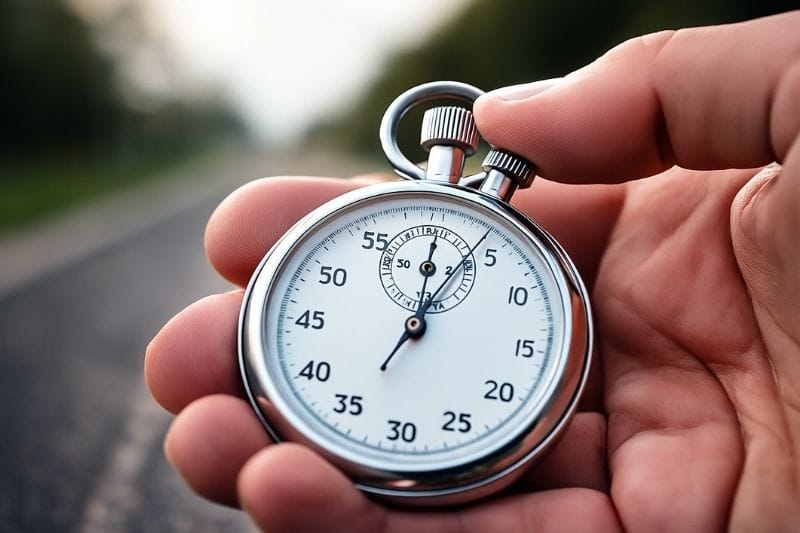Whether you are a seasoned athlete or a weekend warrior, there is a unique sense of pride that comes with crossing the finish line of a marathon, a long-distance bike ride, or any endurance event. You put in the work. You stuck to the plan. You dug deep and made it to the end. But then, not long afterwards, that amazing high is often replaced by something much harder to describe. You might feel flat, tired, unmotivated, or even a bit lost. The post-event blues.
I remember doing a big ride from London to Manchester. It was a huge goal at the time and something I had trained hard for. I rode it in one go, non-stop, and afterwards I did not even want to look at my bike. For months. At the time I thought I just needed to get over it. Push through and stop being soft. But I now know that trying to tough it out was the worst thing I could have done.
So why does this happen? Why do so many runners and cyclists feel down after something they have looked forward to for weeks or months? And more importantly, what can you do about it?
Understanding the Post-Event Blues
This dip in mood after a big goal is so common it even has a name. It is often referred to as post-race depression or post-event blues. And it is not just in your head. There are some very real physical, emotional and psychological reasons behind it.
Physical Exhaustion
Endurance events take a lot out of you. Running a marathon, completing a triathlon, or riding a long sportive puts serious strain on your body. Your energy reserves are depleted. Your muscles are sore. Your nervous system is taxed. Even if you finish on a high, that physical crash is coming. It might hit the next day or even a few days later. And it can leave you feeling tired, run down, and emotionally fragile.
During the event, your body releases a cocktail of stress hormones and feel-good chemicals like endorphins. These help to manage pain and give you that buzz of excitement or even euphoria. But once those hormones settle down again, it is very normal to feel flat or low for a while.
Emotional Anticlimax
Training for an event gives you structure and purpose. Your week revolves around getting your sessions in, hitting certain distances, eating well, and building towards something meaningful. When the event is over, that structure suddenly disappears.
You wake up the next morning and think, what now?
There is no longer a countdown. No reason to get your shoes on and head out the door. That lack of direction can feel like a huge emotional hole. And because the goal has been ticked off, it is easy to feel like you have lost your sense of momentum.
Loss of Social Connection
This one is often overlooked but it can be powerful. If you trained as part of a group or had training partners, your shared goal probably brought you closer together. You had people to message, compare sessions with, and celebrate small wins along the way.
After the event, everyone goes back to their usual routines. The WhatsApp group falls quiet. The Sunday rides or long runs stop. That sudden drop in social connection can leave you feeling isolated, even if everything else in your life is still going well.
How to Recover Mentally as Well as Physically
The good news is that this low does not have to last. With the right approach, you can recover well and get back to enjoying your sport without losing motivation or burning out.
Take Active Recovery Seriously
You might think you need to jump back into training straight away, but your body needs time to heal. That does not mean doing nothing. It means choosing movement that feels good. Walking, swimming, light stretching, or a gentle ride with no pace or distance targets can help ease soreness and keep your mood stable.
Avoid the trap of doing another hard event too soon just to fill the gap. Recovery is part of the process, not a sign of weakness.
Plan Your Next Focus
It does not need to be a bigger challenge. In fact, it is often better to choose something small and achievable. That might be a 5K with a friend, trying a new sport, building strength in the gym, or working on mobility. Having a new target, even if it is casual or fun, helps you regain purpose.
Make sure it is something you want to do, not something you feel you should do. This is your time to rediscover enjoyment.
Stay Connected
If you trained with others, keep those connections going. Even if the next event is not on the horizon, meet up for a casual run, ride, or coffee. Talk about how the event went. Laugh about the bits that were awful. Share photos and memories.
Sometimes just acknowledging how strange the post-event period feels is enough to make it more manageable.
Eat Properly
It is tempting to treat yourself after a big event, and rightly so. But recovery is not just about resting your legs. Your body needs fuel. Focus on meals that include protein to help repair muscle, some healthy fats, and plenty of colourful vegetables. Do not forget to keep drinking water as well. Dehydration can make fatigue and mood swings worse.
If you are someone who tracks calories or is trying to manage your weight, give yourself a few days where the focus is on nourishment, not restriction.
Give Yourself Permission to Feel Odd
It is perfectly normal to feel low after something big. Do not beat yourself up for it. Let yourself rest. Be honest about what you are feeling. If you find it helps, write things down. Journaling your training and your post-event thoughts can be a good way to process what went well, what was hard, and what you might want to do differently next time.
Talk to Someone
If your low mood lasts a while or starts to affect your sleep, your appetite, or your enjoyment of everyday life, do not ignore it. Speak to someone you trust or consider reaching out to a professional. There is no shame in needing support. In fact, a huge number of athletes go through this and never say anything.
How Long Do Post-Event Blues Usually Last?
There is no one-size-fits-all answer. For many people, post-event blues pass within a few days or weeks. You might feel a bit flat, unmotivated or restless for a short while, especially once the initial high wears off and your body starts to feel the impact of what you’ve done.
But in some cases, the low mood can linger for a month or even more. If the event was a huge milestone, something deeply personal, or a goal that gave your life structure for many months, it is not unusual for people to feel a bit lost afterwards. When the training routine stops and there’s no clear next step, that emotional gap can take longer to close.
Some runners and cyclists find it takes a few months to feel fully back to normal. That does not mean anything is wrong – it just means your body and brain are adjusting. The important thing is to keep checking in with yourself. If you’re still feeling flat after a couple of months and it’s affecting your mood, your sleep, or your motivation in everyday life, it might be time to talk to someone about it (as mentioned above).
It is okay to feel this way, and it is okay to ask for support. Recovery isn’t just about muscles and mileage. It’s about mindset too.
You Are Not Alone
Feeling flat after an endurance event is incredibly common. Whether you smashed a personal best or just scraped to the finish line, your body and brain have been through a lot. It is okay to feel a bit lost afterwards. It does not mean you are ungrateful. It does not mean you are lazy. It simply means you are human.
By recognising these feelings for what they are and taking a few simple steps to look after yourself, you will be back on track faster than you think. You might even find you come back stronger, wiser, and with a deeper love for your sport.
So the next time you finish something big, take a breath. Be proud of what you have done. But also give yourself the space to recover. Because the finish line is not the end. It is just part of the journey.
For Those Who Want to Dig Deeper…
There are not a large number of studies dedicated solely to the phenomenon of “post-event blues” in endurance athletes, but several studies touch on related areas, including the psychological aspects of endurance training, mood disturbances following competition, and the relationship between exercise and mental health.
Here is a list of some scientific papers and articles that touch on these related areas:
- Morgan, W. P. (1985). Selected psychological factors limiting performance: a mental health model. In Limits of human performance (pp. 70-80). Champaign, IL: Human Kinetics.
- Lane, A. M., & Terry, P. C. (2000). The nature of mood: Development of a conceptual model with a focus on depression. Journal of Applied Sport Psychology, 12(1), 16-33.
- Raglin, J. S. (2001). Psychological factors in sport performance. Sports Medicine, 31(13), 875-890.
- Sachs, M. L. (1981). Running as therapy: An integrated approach. Lincoln, NE: University of Nebraska Press.
- Steptoe, A., & Butler, N. (1996). Sports participation and emotional wellbeing in adolescents. The Lancet, 347(9018), 1789-1792.
- Scully, D., Kremer, J., Meade, M. M., Graham, R., & Dudgeon, K. (1998). Physical exercise and psychological well-being: a critical review. British Journal of Sports Medicine, 32(2), 111-120.
- Yeung, R. R. (1996). The acute effects of exercise on mood state. Journal of psychosomatic research, 40(2), 123-141.
- Buman, M. P., Omli, J. W., Giacobbi Jr, P. R., & Brewer, B. W. (2008). Experiences and coping responses of “hitting the wall” for recreational marathon runners. Journal of Applied Sport Psychology, 20(3), 282-300.
While the above list offers a broad view of the topic, you might need to delve into the details of each paper to extract information most relevant to the post-event blues in endurance athletes.
You may also like to search databases such as PubMed, Google Scholar, or Web of Science for new papers as they become available.
I can help you…
Looking for a Fitness, Strength or Nutrition Coach for your next event? I can help…




